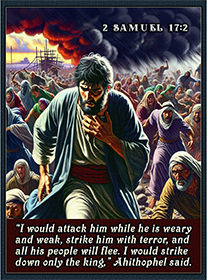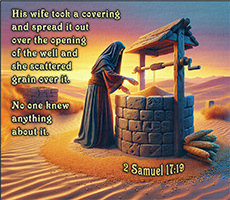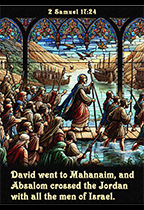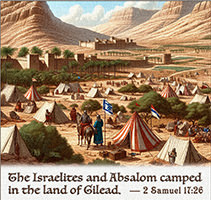2 Samuel 17:1–29 . . . Bible Study Summary with Videos and Questions
“Absalom Gets Good and Bad Advice”
In our last few discussions, we covered the uprising of Absalom. This handsome, brilliant, gifted young son of David fomented a rebellion throughout the whole kingdom and secretly worked against his own father in attempting to take the throne for himself. He finally was so successful that David, with all his court, had to flee the city as an exile. Throughout all of this, David’s heart was penitent and resting upon God. He acknowledged the fact that these things had resulted from his own folly; he trusted God to work it out.
This is a beautiful picture of what our heart attitude should be when we fall into sin and failure, causing evil results. There was never a word of complaint from David; neither did he ever attempt to blame God! There was no bitterness, simply the recognition that God could and would still work this out — and he did. God will restore David to the throne and Absalom will be overtaken, conquered by his own vanity. His long hair (in which he gloried) will get caught in the branches of a tree, enabling Joab, David’s ruthless general, to find him there and kill him. With Absalom’s death, the rebellion will be crushed. But that’s not the whole story. Stay tuned . . .
[Note: Click the link to This Week’s Passage near the bottom of this page to read today’s Scripture.]
Ahithophel’s and Hushai’s Proposed Plans (2 Samuel 17:1–14)
In last week’s summary of chapter 16, we saw Absalom being advised by counselors as to how to pursue and hopefully overtake David. This advice is the pivot on which David’s fortunes turned, in his dealings with Absalom. While David’s loyalists were leaving the city, Absalom and his army (“all the men of Israel”) were entering it. Hushai, David’s confidant, went to Absalom as a “friend of the king” to greet him with the words, “Long live the king! Long live the king!” Most interestingly, Hushai neglected to clarify to which of the two kings he wished long life. He was loyal to David primarily because David, the Lord’s anointed, was “chosen by the Lord” (16:18). Absalom was happy to receive Hushai’s supporting overture, but he wouldn’t include him in his war council so Hushai left that king’s chambers. So Absalom turned to Ahithophel for advice, who suggested that Absalom do something so offensive that it would eliminate any possible reconciliation with David. In today’s text, both of Absalom’s counselors reappear. This time, Hushai’s advice will appear better than Ahithophel’s (v. 14).
Comparing Ahithophel’s Plan A with Hushai’s Plan B Absalom’s next order of business was to pursue David (vv. 1–4). Ahithophel advised immediate pursuit with an army of 12,000 men of Israel who’d already gathered to support Absalom. His proposal, “Attack him while he is weary and weak. I would strike him with terror, and then all the people with him will flee,” was good advice; he advised a quick, selective attack against David only, advising urgency while David was still west of the Jordan River. Absalom and his counselors accepted it. After all, David and his band had traveled 20 miles and were exhausted, exposed, and without shelter or a defensive position. If they waited to attack, David would likely find a fortified city in which to protect himself. If he was to defend himself within a fortress, there’d be significant bloodshed among his followers. That was Ahithophel’s proposed Plan A.
Looking more closely at Ahithophel’s advisory, it was exceedingly attractive and shrewd in several ways. First, it would have worked, barring the direct intervention of God. Second, David could have been defeated quickly and relatively easily, with a minimal loss of life and a nominal expenditure of energy. Third, it offered an appealing course of action to Absalom who, not unlike his father David, could have stayed home from the battle and made love while Ahithophel and his army made war with David. Absalom could quickly possess the throne without the dangers or discomforts of going into battle. As an added incentive, he could indulge himself with David’s wives, thereby hurting and humiliating his father. Only David — Absalom’s real enemy — needed to be killed.
However, we’ll now see God’s hand at work. The author will soon write: “For the Lord had determined to frustrate the good advice of Ahithophel in order to bring disaster on Absalom.” We’re not told why Absalom sought Hushai for a second opinion. It’s a remarkable evidence of the hand of God; and it’s the answer to David’s prayer in 15:31 that Absalom even asked for another opinion after receiving such wise, well-received counsel. Enter Hushai and his Plan B. Note that Hushai didn’t have time to reflect on what he should say; he was brought into Absalom’s presence, told what Ahithophel had advised, and asked to respond. But Hushai’s response was brilliant! He began by acknowledging Ahithophel’s wisdom and skill as an advisor, but then went on to state that his counsel wasn’t good this time. Ahithophel was almost always right, but not this time.
Realize that Hushai had a significant handicap: Absalom and everyone in Israel knew that Hushai was David’s longtime friend. So, how could Absalom trust a man who’d been David’s friend? His counsel was likely to become suspect. Rather than try to avoid this issue, Hushai used his friendship with David in a unique way, almost as if he'd said, Because I know him better than any of you, I’m sure he’ll respond to Absalom’s revolt.
Absalom was new to governing, unsure about whether to take only Ahithophel’s advice. To reassure himself, he wanted to hear Hushai’s opinion, so he sent for him. Hushai learned what Ahithophel had advised Absalom and was asked to comment on it. He replied: “The advice Ahithophel has given is not good this time” (v. 7) and proceeded to critique it for Absalom: (1) David’s men are fierce fighters and would defend their king because they were “as fierce as a wild bear robbed of her cubs” (v. 8); (2) David won’t likely be found with his troops but will be hidden elsewhere; and (3) if David were to attack your troops Absalom, on his terms, it could result in a slaughter, causing your support to evaporate and “melt with fear” (v. 10).
In v. 9, Hushai warned that if only a small group of Absalom’s men pursued David, and he defeated them, news would spread that Absalom had lost the battle, and the people would then side with David. Hushai proposed the ultimate flattery, namely, that Absalom should boldly lead a large number of his troops into battle, which is what kings usually did (v. 11). When he suggested, “with you yourself leading them into battle” (v. 11b), Hushai was favoring Absalom’s vanity, encouraging him to prove that he was a mighty soldier like his father. In Ahithophel’s Plan A, Ahithophel led the battle; in Hushai’s Plan B, Absalom led the battle. Yahweh sought to bring calamity on Absalom (v. 14) causing him and the elders to favor Hushai’s Plan B because Absalom sought to overthrow the Lord’s anointed.
Absalom had the smartest man in Israel on his side, but David’s prayer was mightier than Ahithophel’s smarts. God could lead Ahithophel to give foolish counsel that was listened to (as in 16:20–23). Or, God could have allowed Ahithophel to give great advice and yet have it be rejected. No matter: God was clearly in control.
Interestingly, Hushai made each of his three points wisely by introducing the fear element. He recited the legendary reputation of David and his mighty men as insurmountable fighters. That is: If you don’t win the first battle, Hushai was warning Absalom, you’ll lose all your support! So he offered Absalom a Plan B that give David an opportunity to escape: Don’t attack until you can gain huge superiority in numbers. That way you’ll have the manpower to defeat him wherever you find him. Even if he finds refuge in some walled city, your increased number of troops will be sufficient to utterly destroy the city. David won’t have a chance! And Hushai proposed his Plan B so convincingly by including striking visual images that his hearers could almost see and taste their upcoming victory.
While Ahithophel’s counsel was straightforward, Hushai’s was laced with powerful imagery and sensitive phrases: “Fierce as a wild bear robbed of her cubs”; “the bravest soldier, whose heart is like the heart of a lion, will melt with fear”; troops “as numerous as the sand on the seashore”; “we will fall on him as dew settles on the ground”; and we’ll destroy any city by dragging it with ropes “down to the valley until not so much as a pebble is left.” Hushai’s two-part Plan B created an initial fear of attacking too soon followed by inspiring overconfidence in waiting until they’d vastly outnumber David’s forces. His was a masterful speech that Absalom and his men believed and adopted.
Hushai’s Plan B also brought about a bigger battle than Ahithophel proposed; not only would many of Absalom’s supporters die, but we’ll soon see that Absalom himself would be killed, thus ending the revolution. Plan B gave David the time he needed to get into his kind of battle — guerrilla warfare, in which he’d be able to fight on his turf. Hushai’s plan made Ahithophel’s counsel seem foolish, which was exactly David’s prayer request (15:31). His short prayer brought about his deliverance and his enemies’ defeat.
Hushai’s course seemed safer to the new, unsure king. But the real reason that his Plan B worked was because “the LORD had determined to frustrate the good advice of Ahithophel” (v. 14b). Because the Lord was with him, and because he was an instrument in God’s hands, Hushai’s presentation was flawless!
David Is Warned of Absalom’s Plan (vv. 15–23)
For the moment at least, Absalom had chosen Hushai’s counsel over Ahithophel’s. While Hushai’s plan bought David a little time, it would also result in an attack by a much larger army, led by Absalom. It was now a matter of great urgency to inform David about what had transpired; he needed to escape beyond the Jordan to establish a camp that would offer him protection and give him the military position from which to successfully defend himself against the coming attack of Absalom and his followers. So Hushai sent word to Zadok and Abiathar, the priests, informing them of his counsel and Ahithophel’s while instructing both priests to send word to David by way of Jonathan and Ahimaaz who were staying at En Rogel, a valley village south of Jerusalem.
15Hushai told Zadok and Abiathar, the priests, “Ahithophel has advised Absalom and the elders of Israel to do such and such, but I have advised them to do so and so. 16Now send a message at once and tell David, ‘Do not spend the night at the fords in the wilderness; cross over without fail, or the king and all the people with him will be swallowed up’” (2 Sam. 17:15–16).
Hushai’s advisory to the two priests, “Do not spend the night at the fords in the wilderness; cross over without fail” meant that David should promptly cross the Jordan River, giving him room and time to regroup before Absalom’s attack. Starting in v. 17, David will be warned. But, as a result of this successful intelligence operation, David will escape immediate danger from Absalom. The account gets dramatic as you’ll read on.
Unfortunately for David, one of Absalom’s supporters spotted Jonathan and Ahimaaz (v. 18), who seems to have been known as being loyal to David. This precipitated a search for the two, since they were apparently on their way to report to David. The two men hastily departed and came to the house of another David supporter who lived in Bahurim. There, the supporter’s wife hid the two men in a well, covering it and then placing grain over the covering to conceal them from Absalom’s servants who left for Jerusalem when they couldn’t find the men.
The two priests’ sons quickly ran to David’s camp to tell what had happened, urging him to cross the Jordan quickly to find a safe refuge. By dawn, David and all those with him had crossed the river (v. 22). The immediate effect of David crossing the Jordan was Ahithophel’s suicide, followed by David establishing a defensible base at Mahanaim and gaining provisions, while Absalom began the lengthy process of assembling a large army for the final confrontation. As it turned out, Hushai’s warning to David via the two sons wasn’t needed. Absalom had taken Hushai’s advice to wait to attack until he could muster a large enough army. That decision marked the beginning of Absalom’s downfall.
Ahithophel remained in Jerusalem only long enough to be convinced that his wise counsel wouldn’t be heeded by Absalom. Once it was clear that Hushai’s counsel had prevailed, Ahithophel knew he was finished. He’d gambled everything by assuming that Absalom would prevail over King David. Sadly, now that he knew that Absalom was destined for defeat, he went back home and killed himself.
Absalom’s Death Is Near (vv. 24–29)
As Absalom crossed the Jordan in hot pursuit of David, David passed through the gates of Mahanaim where God provided for David in tangible and visible ways. Mahanaim, on the Jabbok River in Transjordan, had been Ish-Bosheth’s capital. David probably went there because the inhabitants favored him for his goodness to Mephibosheth, Saul’s grandson. When he and his faithful followers arrived, there were those ready and willing to help. The first named is Shobi, the son of Nahash, the king of the Ammonites. The second supporter to come to David’s aid at Mahanaim was Machir, the son of Ammiel from Lo Debar (v. 27); he’s the man who took in Mephibosheth after the deaths of King Saul and Jonathan. Finally, Barzillai the Gileadite, an eighty-year-old friend and man of great wealth, brought supplies for David and those with him. The three demonstrate other characteristics of true friends: they initiated help for David and supplied him abundantly, meeting his needs and wants. How encouraging these men and their assistance must have been to David.
The three helpers mentioned herein — Shobi, Machir, and Barzillai — are interesting because of their diverse backgrounds, previous loyalties, and the risk they took to publicly support David at the absolute lowest point of his reign. David’s helpers weren’t dramatic warriors. However, they helped David in this crisis as much as the bravest soldier. They were specially sent by God to comfort and support David during his affliction.
† Summary of 2 Samuel 17:1–29
This passage records the unfolding events as Absalom’s rebellion advances and God providentially works to protect David. Ahithophel advises Absalom to let him take 12,000 men immediately to pursue David that night, aiming to strike only the king and bring back all the people to Absalom (17:1–4). His counsel pleases Absalom and Israel’s elders, but Absalom also seeks the advice of Hushai the Archite (vv. 5–6). Hushai, serving as David’s covert ally, counters Ahithophel’s plan by warning that David and his men are fierce warriors who’ll be ready for battle, and suggests gathering all Israel under Absalom to confront David with overwhelming force (vv. 7–13). Absalom and the men of Israel choose Hushai’s counsel over Ahithophel’s, not realizing this was the Lord’s doing to bring disaster on Absalom (v. 14). Hushai then warns Zadok and Abiathar the priests, who send word via their sons, Jonathan and Ahimaaz, for David to cross the Jordan quickly (vv. 15–16). Although pursued, the messengers hide in a well until the danger passes, and they successfully deliver the message to David (vv. 17–22).
Upon learning that his advice has been rejected, Ahithophel saddles his donkey, returns to his home city, sets his affairs in order, and hangs himself, ending his life (v. 23). Meanwhile, David safely crosses the Jordan into Mahanaim, and Absalom follows with all Israel and Amasa as commander of his army (vv. 24–26). In Mahanaim, David and his people receive generous provisions from wealthy supporters Shobi, Machir, and Barzillai, who bring food, bedding, and supplies to refresh them in their weariness (vv. 27–29).
Key points with verse references:
• Ahithophel advises Absalom to let him immediately pursue David with 12,000 men, aiming to kill only the king (vv. 1–4).
• Hushai counsels Absalom to reject Ahithophel’s plan, warning of David’s strength and suggesting a massive united force from all Israel (vv. 7–13).
• God ordains that Absalom accepts Hushai’s advice, enabling Hushai to send word through the priests to urge David to cross the Jordan (vv. 14–16).
• Jonathan and Ahimaaz evade capture by hiding in a well and successfully warn David, who promptly moves his people safely over the Jordan (vv. 17–22).
• Ahithophel, seeing his advice rejected, returns home and hangs himself, while David receives much-needed provisions from allies in Mahanaim (vv. 23–29).
This chapter highlights God’s sovereignty in defeating the plans of the wicked, the loyalty of David’s supporters, and the tragic end of a man who turned away from God’s path.
This Week’s Passage
2 Samuel 17:1–29
New International Version (NIV) [View it in a different version by clicking here; also listen to chapter 17 narrated by Max McLean.]
Summary Video: “The Second Book of Samuel”
† Watch this introductory video clip created by BibleProject on bibleproject.com.
- Q. 1 After considering Plans A and B, why didn’t Absalom go with the plan that predicted an easy, bloodless victory?
- Q. 2 Does Hushai’s loyalty to David justify deceiving Absalom or confounding Ahithophel? Why or why not?






